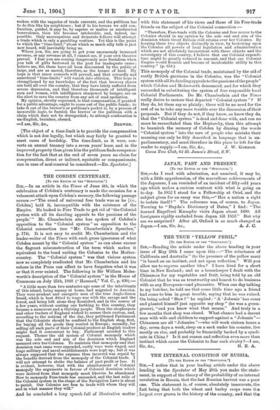LTO THE EDITOR OF THE "SPECTATOR?'] SIR,—In an article in
the Times of June 4th, in which the celebration of Cobden's centenary is made the occasion for a vehement attack upon Cobden's memory, the following passage occurs :—" The creed of universal free trade was as he [i.e., Cobden] held it, incompatible with the existence of the Empire. He looked to Free Trade to get rid of the Colonial system with all its dazzling appeals to the passions of the people.' " Mr. Chamberlain also has spoken of Cobden's opposition to the "Colonial system" as opposition to the Colonial connection (see "Mr. Chamberlain's Speeches," p. 174). It is not easy to credit Mr. Chamberlain and the leader-writer of the Times with such gross ignorance of what Cobden meant by the "Colonial system" as can alone excuse the flagrant misconstruction of the term which makes it equivalent to the bond uniting the Colonies to the Mother- country. The "Colonial system" was that vicious system now so completely eradicated that Mr. Chamberlain and his echoes in the Press can affect to have forgotten what it was or that it ever existed. The following is Sir William Moles- worth's description of the "Colonial system" in the House of Commons on July 25th, 1848 (" Hansard," Vol. C., p. 830) :— "A little more than two centuries ago some of the inhabitants of this island, being uneasy at home, had migrated to America. They were prudent and energetic men of the true Anglo-Saxon breed, which is best fitted to wage war with the savage and the forest, and being left alone they flourished, and in the course of a few years, without costing one farthing to this country, they became a numerous and a thriving people. Then the shopkeepers and other traders of England wished to secure their custom, and, according to the notions of the day, they petitioned Parliament that the Colonists should be confined to the English shop, first, for buying all the goods they wanted in Europe ; secondly, for selling all such parts of their Colonial produce as English traders might find it convenient to buy. Parliament acceded to this request. Thence the old system of Colonial monopoly which was the sole end and aim of the dominion which England assumed over her Colonies. To maintain that monopoly-and that dominion vast sums were expended, costly wars were waged, and huge military and naval establishments were kept up; but it was always supposed that the expense thus incurred was repaid by the benefits derived from the monopoly of the Colonial trade. I will not attempt to strike the balance of past profit or loss. It is evident, however, that with the abandonment of Colonial monopoly the arguments in favour of Colonial dominion which were derived from that monopoly must likewise be abandoned. Now to monopoly Free-trade has succeeded, and the last relic of the Colonial system in the shape of the Navigation Laws is about to perish. Our Colonies are free to trade with whom they will and in what manner they wilL"
And he concluded a long speech full of illustrative matter ;
" Therefore. Free-trade with the Colonies and free access to the Colonies- should in my opinion be the sole end and aim of the dominion which Great Britain still retains over her Colonies. By keeping these two objects distinctly in view, by bestowing upon the Colonies all powers of local legislation and administration which are not absolutely inconsistent with these objects and the sovereignty of this country, I believe that our Colonial expendi- ture might be greatly reduced in amount, and that our Colonial Empire would flourish and become of incalculable utility to this country." (p. 853.)
This monopoly of the Colonial trade, maintained by the aid of costly British garrisons in the Colonies, was the "Colonial
system with all its dazzling appeals to the passions of the people" which Cobden and Molesworth denounced, and for which they succeeded in substituting the system of free responsible local Colonial Parliaments. Do Mr. Chamberlain and the Times really desire to restore that departed "Colonial system " ? If they do, let them say so plainly; there will be no need for the rest of us to take any more trouble over the discussion of their proposals. But if they do not, if they know, as know they do, that the "Colonial system" is dead and done with, and can no more be resuscitated than the Heptarchy, then this attempt to besmirch the memory of Cobden by dinning the words "Colonial system" into the ears of people who mistake their meaning can only be fitly described in language that is un- parliamentary, and must therefore in this place be left for the reader to supply.—I am, Sir, &o., J. W. GORDON. Cocoa Tree Club, 64 St. James's Street, S. W.










































 Previous page
Previous page